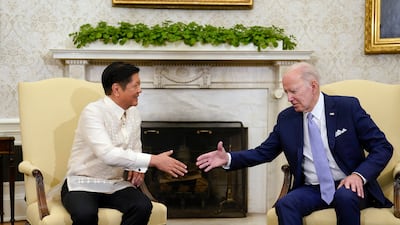US President Joe Biden and Philippines President Ferdinand Marcos Jr bolstered defence ties and stressed "the importance of maintaining peace and stability across the Taiwan Strait" on Monday after meeting at the White House.
The meeting comes at a moment the White House called “deeply critical” for the Indo-Pacific region and marks the latest step in improved ties between Washington and Manila.
The US and its former colony are working to present a united front against China as it expands its influence, particularly in the South China Sea, and as the risk of conflict over Taiwan increases.
"The leaders underscore their unwavering commitment to freedom of navigation and overflight in the South China Sea," Mr Biden and Mr Marcos said in a joint statement.
Improved US ties with the Philippines come after years of troubled relations under Mr Marcos's predecessor Rodrigo Duterte, who built closer ties with China during his tenure and left behind a track record of human rights abuses.
In their joint statement, Mr Biden and Mr Marcos announced four new sites pursuant to the US-Philippines Enhanced Defence Co-operation Agreement, "which will strengthen Philippine security and support the Armed Forces of the Philippines’ modernisation goals".

The White House also announced that it intends to transfer two Island-class patrol vessels, two Protector-class patrol vessels, and three C-130H aircraft, to Manila's Armed Forces, pending applicable Congressional notification requirements.
Security matters include defence guidelines aimed at deepening “alliance co-operation and interoperability across operational domains including land, sea, air, space and cyberspace", a White House official said.
Many Filipinos have grown frustrated by China's actions in the South China Sea.
The Biden administration said the “extremely significant” visit comes at a critical moment, pointing to “provocative acts on the part of China testing and probing into the Philippine waters”.
“Recent events have caused much greater focus in both capitals on taking the necessary steps to up our game to improve engagement on the security side between the United States and the Philippines,” a senior Biden administration official said on Sunday.
The official said Mr Biden would use Mr Marcos's visit to reinforce that “an armed attack on Philippine Armed Forces public vessels or aircraft in the Pacific, including in the South China Sea, would invoke US mutual defence commitments”.
The Philippines on Friday accused China's coastguard of “aggressive tactics” after an incident during a Philippine coastguard patrol close to the Second Thomas Shoal.
The Biden administration responded on Saturday with a statement of solidarity with Manila, calling on Beijing to “desist from its provocative and unsafe conduct”.
China said it was willing to handle maritime differences with countries of concern in the South China Sea through friendly consultations and warned the US against interference.
Mr Marcos recently agreed to expand the parameters of the Philippines-US Enhanced Defence Co-operation Agreement, which grants the Pentagon access to strategic bases across the Philippines.
White House National Security Council spokesman John Kirby on Monday said that development was “about our ability to be better allies to one another and to better meet our commitments to each other”.
US Defence Secretary Lloyd Austin visited Manila in February, when the Philippines agreed to open up as many as nine bases, including some close to the South China Sea and Taiwan’s southern shores, to the Pentagon.
The Biden administration has continued a “pivot to Asia” in its defence priorities, centred on countering China.
The White House's defence budget proposal for fiscal year 2024 included $9.1 billion for the Pacific Deterrence Initiative, which is geared towards boosting Washington's regional competitiveness against Beijing, and $37.7 billion for modernising US nuclear capabilities.
And the historic Aukus deal with the UK and Australia is aimed at sharpening western-aligned Indo-Pacific defence capabilities.


